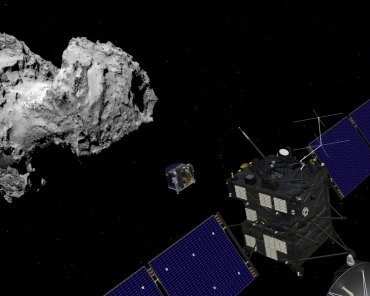How planets and moons are named

Artist's conception: The Rosetta orbiter deploying the Philae lander to comet 67P/Churyumov–Gerasimenko. (Image is not to scale.) Image: ESA.
The European Space Agency asked space watchers to suggest names for the site where the landing will take place. The winner will be invited to the European Space Operations Center in Darmstadt, Germany, to follow the landing live from the control center.
The competition ended Oct. 22. The winner will be announced Nov. 3 on the main Rosetta web page. But space agencies didn’t always ask for public input on names. To the contrary, this is the traditional method:
The competition ended Oct. 22. The winner will be announced Nov. 3 on the main Rosetta web page. But space agencies didn’t always ask for public input on names. To the contrary, this is the traditional method:
- The names of planets and their moons are governed by an organization called the International Astronomical Union (IAU), according to NASA. Planets in our solar system received names long ago based on Greek or Roman mythology. Mars, famously, was the Roman god of war.
- Modern technology has made it possible to see more objects in space. This is great, but it complicates things, notes the IAU website. Jupiter’s satellites, for example, “have previously been named for Zeus/Jupiter's lovers and favorites but now Zeus' descendants are also included as an allowable source of names,” the website says. Saturn’s satellites have been named for the “Greco-Roman Titans, descendants of the Titans, Giants and the Roman god of the beginning.” But the union is now more inclusive, allowing “names of giants and monsters in other mythologies (so far Gallic, Inuit and Norse).”
- So what happens if there is a newly discovered satellite? It is reported to the IAU and given a provisional name. This provisional name is unexciting. It consists of “the letter S followed by the year of discovery and a number indicating the order of discovery within that year,” the website explains.
- There’s more. Once the satellite is confirmed, the discoverer suggests a final name, according to IAU.The organization will prioritize the name suggested by the discoverer. Satellites of minor planets will, “where possible and appropriate, receive names of mythological characters closely related to the name of the primary [body] and suggesting the relative sizes.” Consider Pluto, named for the Roman god of the underworld -- a scary type capable of making himself invisible. Satellites sharing Pluto’s orbital rhythm “should take the name of underworld deities,” the organization says.
- Planetary names should be accessible. The union specifically instructs that the names of minor planets should be “16 characters or less in length, preferably one word, pronounceable (in some language), non-offensive” and not too similar to the name of some other minor planet or satellite.
Related:
Spacecraft to give up-close view of comet

